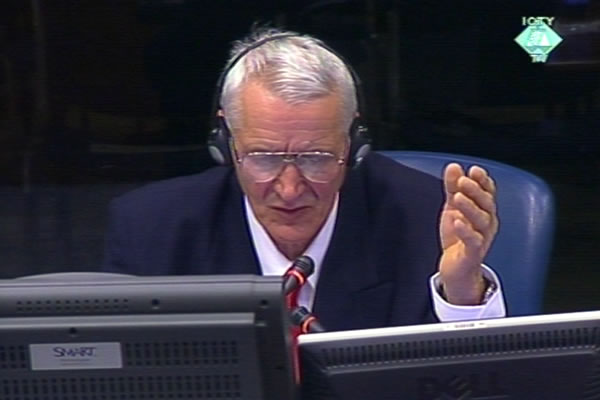Home
PRSTOJEVIC AND KARADZIC AGREE ON EVERYTHING
Radovan Karadzic cross-examined Nedjeljko Prstojevic, who served as president of the municipal crisis staff in Ilidza, part of Sarajevo. Prstojevic ‘agreed absolutely’ with all claims put to him by the former Republika Srpska president
 Nedjeljko Prstojevic, witness at the Radovan Karadzic trial
Nedjeljko Prstojevic, witness at the Radovan Karadzic trial ‘I agree absolutely, Mr. president’: this is how Nedjeljko Prstojevic replied to most of the questions asked by the accused Radovan Karadzic as he cross-examined Prstojevic, who was president of the municipal crisis staff in Ilidza, part of Sarajevo, during the war. The witness expressed his ‘absolute agreement’ with Karadzic’s claims even when the accused quoted from Prstojevic’s earlier statements to the OTP and his evidence in the Momcilo Krajisnik trial; in the examination-in chief, Prstojevic for the most part repudiated those statements.
At the beginning of his testimony, Prstojevic made a number of corrections to his testimony at the Krajisnik trial and asked for permission to provide additional explanations and interpretations of some terms, documents and previous statements that might incriminate Karadzic. This prompted the judges to decide that Prstojevic should testify viva voce instead of through his written statement and transcripts.
With Prstojevic’s help Karadzic tried to prove that in 1991, Muslims planned to declare an ‘Islamic Republic’ and intended to ‘expel all Christians’. They changed the ethnic structure of some municipalities by settling Muslims from Sandzak there, Karadzic argued. Muslims also urged their women to have five children; ‘one of them would be sacrificed for Bosnia’. ‘I agree absolutely’, Prstojevic confirmed, describing in detail ‘the fear’ that the Serbs felt as they listened to the stories related by the women in Ilidza ‘over coffee’.
All the while, Serbs made every effort to ‘maintain peace’ and to transform Bosnia through a democratic process with a consensus of all three constituent peoples, Karadzic put to Prstojevic, who agreed wholeheartedly. The Assembly of the Serb Municipality of Ilidza was established as early as on 3 January 1992, but according to Prstojevic, it was ‘merely a formality, a declaration, an assembly that was preventive in its nature’. It only became operational when the war broke out. The war, as Karadzic and Prstojevic agreed, was declared by the Muslims when they declared a general mobilization. Everything that was done in Ilidza after that point in time was based on the Rules of All People’s Defense and Social Self-Protection, Prstojevic explained, brandishing a red booklet he had dug out of his briefcase, and not on the infamous Instruction issued by the SDS Main Board in December 1991, known as Variants A and B.
After that, with the aid of the documents produced by Karadzic, Prstojevic was able to describe how ‘Alija’s shock troops’ attacked Serbs in Ilidza in April 1992. ‘They fired on us so fiercely’, Prstojevic said, that ‘by mid-April they ran out of ammunition’. Apart from the Patriot League and other Muslim forces that attacked from the ‘outside’, Serbs were also attacked ‘from within, by the fifth column’, Muslims from Ilidza who lived there until 22 April 1992, Prstojevic explained.
When Karadzic quoted parts of Prstojevic’s statement to the OTP investigators about ‘Muslim attacks on Ilidza’ in April 1992, Prstojevic ‘agreed absolutely’ with the accused twice in a row. On another occasion, the witness said that in 2003, when he gave the statement to the OTP investigators, he was ‘younger and was able to explain things better than now’.
Nedjeljko Prstojevic’s cross-examination will continue on Monday. The trial will then be suspended for two months to enable Karadzic to inspect the materials the prosecution has disclosed to him with some delay.
Linked Reports
- Case : Karadzic
- 2011-03-17 UNPROFOR CONSIDERED TARGETING BH ARMY POSITIONS
- 2011-03-16 KARADZIC BLAMES MUSLIM PROPAGANDA
- 2011-03-15 AKASHI WAS ‘IRRESISTIBLE’, KARADZIC ‘TOLERANT’
- 2011-03-21 ‘RUMORS AND GOSSIP’ ABOUT THE EXPULSIONS OF MUSLIMS
- 2011-03-24 KARADZIC WANTS TO CROSS-EXAMINE ERDEMOVIC
- 2011-04-06 KARADZIC: NO CASE TO ANSWER AS TO FLEA MARKET INCIDENT
